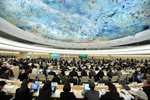 AFP: Human rights violations in Iran spiralled in 2012, a United Nations monitor said Monday, spotlighting abuses including repression of freedom of speech, torture and secret executions. By Jonathan Fowler
AFP: Human rights violations in Iran spiralled in 2012, a United Nations monitor said Monday, spotlighting abuses including repression of freedom of speech, torture and secret executions. By Jonathan Fowler
 GENEVA (AFP) — Human rights violations in Iran spiralled in 2012, a United Nations monitor said Monday, spotlighting abuses including repression of freedom of speech, torture and secret executions.
GENEVA (AFP) — Human rights violations in Iran spiralled in 2012, a United Nations monitor said Monday, spotlighting abuses including repression of freedom of speech, torture and secret executions.
“The prevailing situation of human rights in Iran continues to warrant serious concern,” Ahmed Shaheed told the UN Human Rights Council.
“The situation for individuals in Iran who advocate for the advancement of human rights, or those that document, report, or protest against human rights violations is grave and continues to deteriorate,” he added.
Those who speak out “continue to be subjected to harassment, arrest, interrogation, and torture and are frequently charged with vaguely-defined national security crimes, which is seemingly meant to erode the frontline of human rights defence in the country”.
In a written report to the Council — the UN’s top human rights body — Shaheed pointed to an “apparent increase in the degree of seriousness” of violations in the Islamic republic.
He highlighted “frequent and disconcerting” reports about “punitive state action” against a number of groups, including the jailing of opposition politicians, journalists and human rights campaigners.
He also expressed concern about rights violations affecting women and religious and ethnic minorities, and retaliatory action against individuals that Tehran suspects of cooperating with UN monitors.
Such abuses remain “widespread”, “systemic” and “systematic”, said Shaheed, former foreign minister of the Maldives who was named the UN’s Iran monitor in 2011.
Shaheed, whose requests to visit the country have been denied by Iran, said he regretted Tehran’s unwillingness to cooperate, despite his repeated efforts. He wrote his report by contacting campaigners, exiles and victims of the abuses.
“Moreover, a lack of government investigation and redress generally fosters a culture of impunity,” he said, emphasising that this undermined global human rights accords signed by Iran.
The torture of detainees was also an ongoing concern which Shaheed said he had raised in a previous report.
“The Iranian government maintained that allegations of torture in the country are baseless since the country’s laws forbid the use of torture and the use of evidence solicited under duress,” he said.
“The existence of legal safeguards does not in itself invalidate allegations of torture, and does not remove the obligation to thoroughly investigate such allegations,” he added.
Turning his focus to executions, Shaheed said that while 297 were officially announced by the government — 58 of them carried out in public — some 200 “secret executions” had been acknowledged by family members, prison officials or members of the judiciary.
Nearly 500 executions — both official and unofficial — were carried out in 2012, compared to 661 in 2011, and 542 the year before.
Despite that drop, the number of executions had nevertheless risen progressively in recent years, Shaheed said, having stood at less than a hundred a year a decade ago.
He said he was “alarmed” by the escalating rate “especially in the absence of fair trial standards” and for offences which did not warrant capital punishment including alcohol consumption, adultery and drug-trafficking.
Iran’s delegate at the Council, Mohammad Larijani, who heads his country’s human rights body, blasted Shaheed’s findings.
“The report before this august body today is the product of an unhealthy, non-objective and counter-productive exercise initiated by the United States of America and its European allies,” he said, adding that it was a “compilation of unfounded allegations”.
But the US ambassador to the Council, Eileen Donahue, dismissed Larijani’s comments, saying “there are indications of an intensifying crackdown on human rights defenders and civil society actors”.
“We see this as an effort to quash remaining dissent before the Iranian presidential elections” in June, she told reporters. “This is a very ominous sign.”


